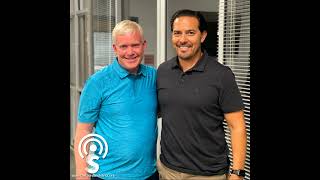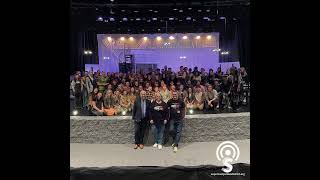Episode 99: HHS Teacher David Kozlowski Talks About Teens and Social Health
He is a former University of Utah football player not afraid to tackle any topic or issue when it comes to teens and improving social health.
On this episode of the Supercast, we sit down with Herriman High School teacher and licensed marriage and family therapist David Kozlowski. Find out about a class Mr. Kozlowski created at Herriman High called “Level Up,” which is getting statewide recognition and helping students improve their relationships with family, friends, teachers and others in their lives.
Audio Transcription
Anthony Godfrey:
Hello and welcome to the Supercast. I’m your host Superintendent Anthony Godfrey. He is a former University of Utah football player, not afraid to tackle any topic or issue when it comes to teens and improving social health. On this episode of the Supercast, we sit down with Herriman High School teacher and licensed marriage and family therapist David Kozlowski. Find out about a class Mr. Kozlowski created at Herriman High called ‘Level Up’, which is getting statewide recognition and is helping students improve their relationships with family, friends, teachers, and others in their lives.
We are here at Mountain Ridge High School with David Kozlowski, who just spoke with all of the administrators in the District for our Administrative Leadership Conference. I couldn’t let him get away without stopping to talk with him about some of the ideas he has for connecting with teens and with each other, and just to share some of his insights with our listeners. Thank you for joining us, first of all. Thank you for the message you have to share with administrators today.
David Kozlowski:
It was a great pleasure for me, especially now that I’m a teacher at Herriman High School to talk to peers and people that are in the trenches. It’s really cool, because usually I just talk to parents, but now I feel I got to talk to parents and professionals in education. So it was huge enjoyment for me.
Anthony Godfrey:
Tell everybody a little bit of your story and how you got to where you are, and then I want to talk about your connection to teaching after that.
David Kozlowski:
I never once in a day in my life woke up and said, ‘I think I want to talk about feelings for a living when I get older.” I was trying to go the macho route. I have two older brothers that played in the NFL. Well, I was adopted, it’s a long story. My grandmother adopted me. She raised me with her kids and her new husband. So I was raised by my half uncles and aunts as my siblings basically. So I thought I wanted to be a sports athlete like them. I was fortunate enough to get a scholarship to the University of Utah to play football, but I really didn’t love football. It wasn’t really like the thing I loved to do, and I had a lot of problems in college. I just got done talking about it here to the administrators, but to make really long story short, I had a very serious suicide attempt. I’d had a bad relationship breakup with my girlfriend, fiancé at the time, and been told that I could never play football again because I had concussion problems. I was in a coma for two days from an accident. So it was like a really bad, traumatic brain injury, with a speech impediment and everything. I started going to a therapist and a counselor and one thing led to another. I was like, “so you just listen to people, talk about their struggles, you ask them questions to help them express himself and they feel better?” He’s like, “Yeah”, I’m like, “that’s a cool job. I want that job.” So I graduated from the University of Utah, went to graduate school, to become a licensed marriage and family therapist and I’ve been in mental health for 22 years.
That kinda got me up until recently, and then with becoming a teacher that was not even a plan thing either for years. I just saw this pattern working with teens and kids. You know, when you see a pattern in something you try and make sense of it first. Then after you see it over and over for years, then you start to go, oh, wait a second, maybe we need to talk about the problem completely differently. It’s called an orthogonal approach. Right? Einstein was famous for that, he looked at what other scientists did. He’s like, “yeah, I’m not interested in that. Do something totally different just to kind of think outside the box.” So for years I’ve been telling school districts and people that I have this idea for a curriculum that was based upon what I saw with private practice. I put on free social support groups for teens and here in the Herriman community for 11 years. So these kids freely are coming every week and I’m just taking notes. It felt like that guy who lived with lions in Africa for like 10 years, they came back to see him, they accepted him. These teenagers forget I’m even there because I look like I’m 12 still, right? I wear vans and I look like an adolescent.
Then I just figured out all these unique things that really led to their problems an…
Information contained on this page is provided by an independent third-party content provider. This website makes no warranties or representations in connection therewith. If you are affiliated with this page and would like it removed please contact editor @riverton.business







